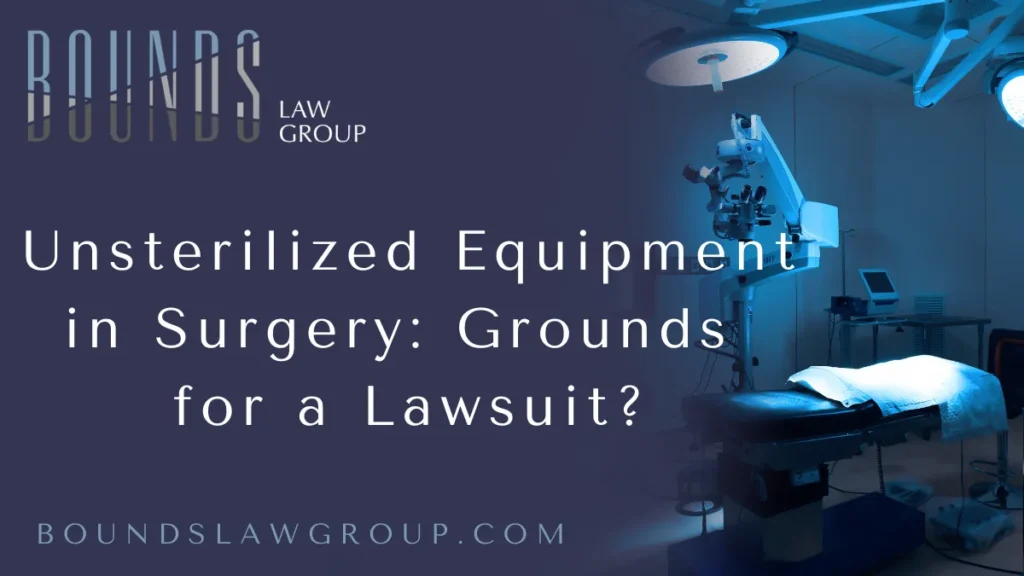
Surgical procedures are meant to heal and improve patients' lives, but when unsterilized equipment is used, the consequences can be devastating. Infections resulting from contaminated surgical tools can lead to severe complications, including prolonged hospital stays, additional surgeries, and even permanent disability or death. If you or a loved one has suffered due to surgical infection malpractice, it is essential to understand your legal rights. At Bounds Law Group, we are dedicated to helping victims of medical negligence seek justice and compensation for the harm caused by unsterile surgical instruments.
Contact us now at 877-644-5122 or complete the free case evaluation form for expert legal assistance.
What Constitutes Surgical Infection Malpractice?
Surgical infection malpractice occurs when a healthcare provider’s negligence leads to a patient developing a post-operative infection. While not all infections are due to malpractice, failure to sterilize surgical tools properly, neglecting infection-control protocols, or ignoring early signs of infection can all form the basis of a valid legal claim.
Examples include:
- Use of unsterilized instruments in surgery
- Failure to follow hospital sterilization procedures
- Cross-contamination from other patients or surfaces
- Inadequate postoperative care leading to undiagnosed infections
If any of these negligent actions can be proven, the responsible party—often a hospital, surgeon, or surgical technician—may be held liable for surgical infection malpractice.
Consequences of Surgical Infections Caused by Unsterilized Equipment
The ramifications of infections caused by unsterilized surgical tools can be severe and long-lasting. Patients often endure:
- Prolonged hospital stays
- Additional surgeries or invasive procedures
- Amputation of affected limbs or tissues
- Sepsis or systemic infections
- Permanent disability
- Emotional trauma and psychological distress
- In extreme cases, death
Patients also face skyrocketing medical bills, time away from work, and lasting impacts on their quality of life. When these outcomes are the result of negligence, Bounds Law Group fights to ensure victims receive the compensation they deserve.

Proving Liability in a Surgical Infection Malpractice Case
To succeed in a surgical infection malpractice lawsuit, several legal elements must be established:
1. Duty of Care
Medical professionals owe patients a duty to provide care that meets accepted medical standards. This includes strict adherence to sterilization protocols.
2. Breach of Duty
A breach occurs when a provider fails to meet those standards—such as by using contaminated instruments, skipping sterilization checks, or not replacing equipment between surgeries.
3. Causation
You must prove that this breach directly caused your infection. Medical experts often provide testimony to establish this link.
4. Damages
Lastly, you must demonstrate that the infection caused measurable harm—physical, financial, or emotional.
Our legal team at Bounds Law Group has extensive experience gathering the evidence, consulting with medical experts, and building strong cases on behalf of injured clients.
Common Signs of Post-Surgical Infections
Recognizing the early signs of post-operative infection can be the difference between recovery and life-threatening complications. Warning signs include:
- Redness, swelling, or heat at the incision site
- Fever or chills
- Pus or drainage from the wound
- Increased pain or discomfort
- Fatigue or malaise
If you experience any of these symptoms after surgery, seek medical attention immediately and request a full evaluation. If an infection is diagnosed, contact a surgical infection malpractice attorney as soon as possible.
How Bounds Law Group Can Help
When you're suffering due to medical negligence, you need a trusted legal advocate by your side. At Bounds Law Group, we take a personalized approach to every case we handle. Our mission is to hold negligent providers accountable and help our clients recover damages for:
- Medical expenses (past and future)
- Lost income and reduced earning potential
- Pain and suffering
- Emotional distress
- Loss of consortium
- Wrongful death (in fatal infection cases)
We work on a contingency-fee basis, meaning you pay nothing unless we win your case. With a proven track record of success in complex medical malpractice litigation, we are equipped to stand up to hospitals, insurance companies, and corporate defense teams.
Time Limits for Filing a Surgical Infection Malpractice Lawsuit
Each state has a statute of limitations that dictates how long you have to file a malpractice lawsuit. These time frames can range from one to three years from the date of injury or discovery of harm. Missing this deadline could forfeit your right to compensation entirely.
That’s why it’s crucial to act immediately if you believe you’ve been a victim of surgical infection malpractice. Do not wait until your condition worsens. Let Bounds Law Group review your case and determine your legal options.

Hospitals' Responsibility and Oversight in Preventing Surgical Infection Malpractice
Hospitals and surgical centers have a legal and ethical obligation to implement rigorous sterilization protocols and enforce strict compliance among their staff. When an infection is traced back to unsterilized equipment, the institution itself may be liable under the doctrine of vicarious liability or corporate negligence.
Hospitals must:
- Maintain and routinely inspect sterilization equipment, including autoclaves and disinfectant systems
- Train all surgical and support staff in sterilization procedures
- Establish clear accountability for cleaning and maintaining surgical tools
- Ensure compliance with state and federal regulations, including those set by the CDC and OSHA
- Conduct audits and implement corrective actions for any infection outbreaks or sanitation failures
Failure to meet these responsibilities can not only lead to surgical infection malpractice claims but can also result in penalties, loss of accreditation, and long-term damage to the institution's reputation.
At Bounds Law Group, we go beyond the individual surgeon or medical provider. We investigate the broader organizational failures that may have contributed to your infection. By exposing systemic negligence, we aim to hold every responsible party accountable—and help prevent future patients from suffering the same harm.
Start Your Case Today
If you or a loved one has suffered a serious infection due to unsterilized surgical equipment, do not face this battle alone. Contact Bounds Law Group today to begin the process of seeking justice.
Complete our free case evaluation form
Call us now at 877-644-5122
We’re ready to listen, advocate, and fight for the compensation you need and deserve.
Sources
- Centers for Disease Control and Prevention (CDC) – A trusted resource detailing infection control standards and the consequences of surgical site infections.
https://www.cdc.gov/hai/ssi/ssi.html - World Health Organization (WHO) – Surgical Site Infections Guidelines – Provides global standards and protocols for preventing infections during surgical procedures.
https://www.who.int/gpsc/ssi-prevention-guidelines/en/ - National Institutes of Health (NIH) – Postoperative Infection Studies – Offers data and case studies on infections caused by unsterile surgical tools.
https://www.ncbi.nlm.nih.gov/pmc/articles/PMC3117187/

